University IT Ethics Report: Retail Reward Programs and Privacy
VerifiedAdded on 2023/03/17
|10
|2359
|54
Report
AI Summary
This report delves into the critical aspects of IT ethics and digital privacy, particularly in the context of retail reward programs. It begins by defining privacy and digital privacy, specifically within the Australian context, highlighting various issues of concern related to digital materials and data security. The report presents several case studies, including privacy breaches by Sony BMG and Hotmail, and assesses the privacy implications of loyalty programs like those used by Woolworths and Coles. It explores options for ensuring digital privacy, such as securing accounts, upgrading software, protecting web browsing, and utilizing secure information systems. Furthermore, the report examines measures to protect users on platforms like Facebook, Google, and iCloud. It discusses the differing levels of privacy required by individuals and the role of legislators in passing new laws to protect privacy with new technologies. The report also emphasizes the responsibility of individuals in safeguarding their own privacy and provides a functional comparison of current privacy laws in the European Union and Australia. The conclusion summarizes the key findings, emphasizing the importance of digital privacy and the ongoing need for robust security measures to address emerging challenges.
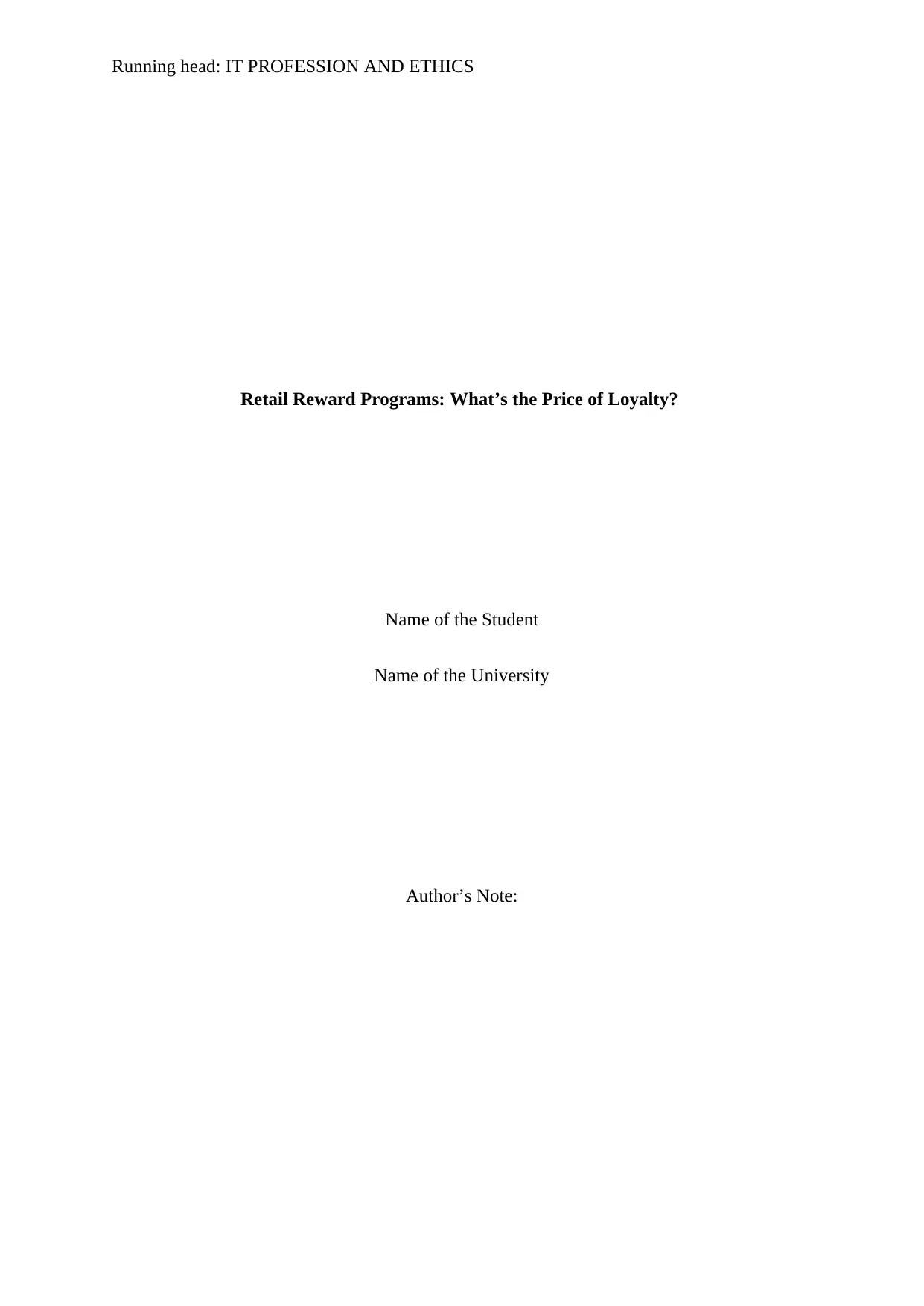
Running head: IT PROFESSION AND ETHICS
Retail Reward Programs: What’s the Price of Loyalty?
Name of the Student
Name of the University
Author’s Note:
Retail Reward Programs: What’s the Price of Loyalty?
Name of the Student
Name of the University
Author’s Note:
Paraphrase This Document
Need a fresh take? Get an instant paraphrase of this document with our AI Paraphraser
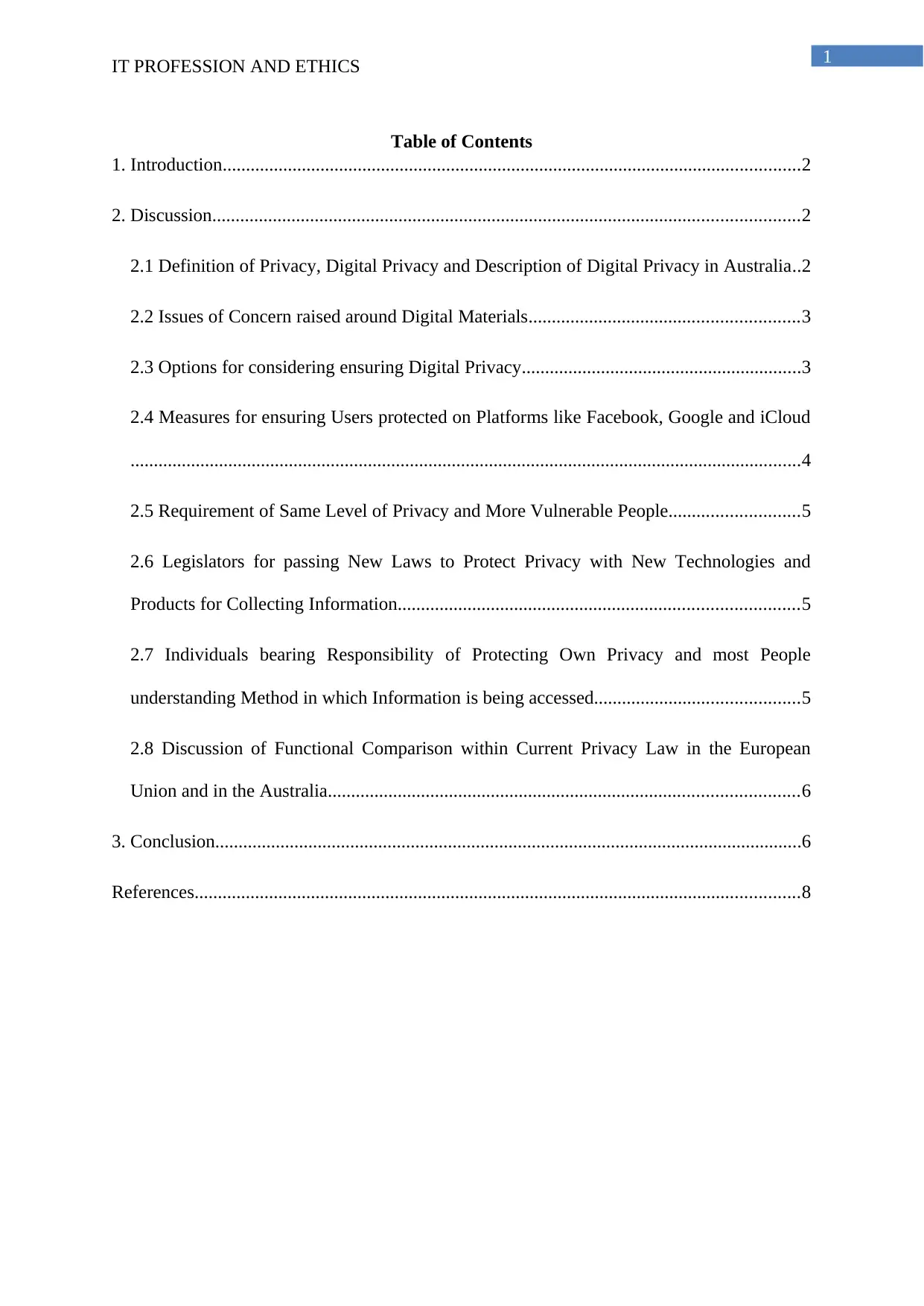
1
IT PROFESSION AND ETHICS
Table of Contents
1. Introduction............................................................................................................................2
2. Discussion..............................................................................................................................2
2.1 Definition of Privacy, Digital Privacy and Description of Digital Privacy in Australia..2
2.2 Issues of Concern raised around Digital Materials..........................................................3
2.3 Options for considering ensuring Digital Privacy............................................................3
2.4 Measures for ensuring Users protected on Platforms like Facebook, Google and iCloud
................................................................................................................................................4
2.5 Requirement of Same Level of Privacy and More Vulnerable People............................5
2.6 Legislators for passing New Laws to Protect Privacy with New Technologies and
Products for Collecting Information......................................................................................5
2.7 Individuals bearing Responsibility of Protecting Own Privacy and most People
understanding Method in which Information is being accessed............................................5
2.8 Discussion of Functional Comparison within Current Privacy Law in the European
Union and in the Australia.....................................................................................................6
3. Conclusion..............................................................................................................................6
References..................................................................................................................................8
IT PROFESSION AND ETHICS
Table of Contents
1. Introduction............................................................................................................................2
2. Discussion..............................................................................................................................2
2.1 Definition of Privacy, Digital Privacy and Description of Digital Privacy in Australia..2
2.2 Issues of Concern raised around Digital Materials..........................................................3
2.3 Options for considering ensuring Digital Privacy............................................................3
2.4 Measures for ensuring Users protected on Platforms like Facebook, Google and iCloud
................................................................................................................................................4
2.5 Requirement of Same Level of Privacy and More Vulnerable People............................5
2.6 Legislators for passing New Laws to Protect Privacy with New Technologies and
Products for Collecting Information......................................................................................5
2.7 Individuals bearing Responsibility of Protecting Own Privacy and most People
understanding Method in which Information is being accessed............................................5
2.8 Discussion of Functional Comparison within Current Privacy Law in the European
Union and in the Australia.....................................................................................................6
3. Conclusion..............................................................................................................................6
References..................................................................................................................................8
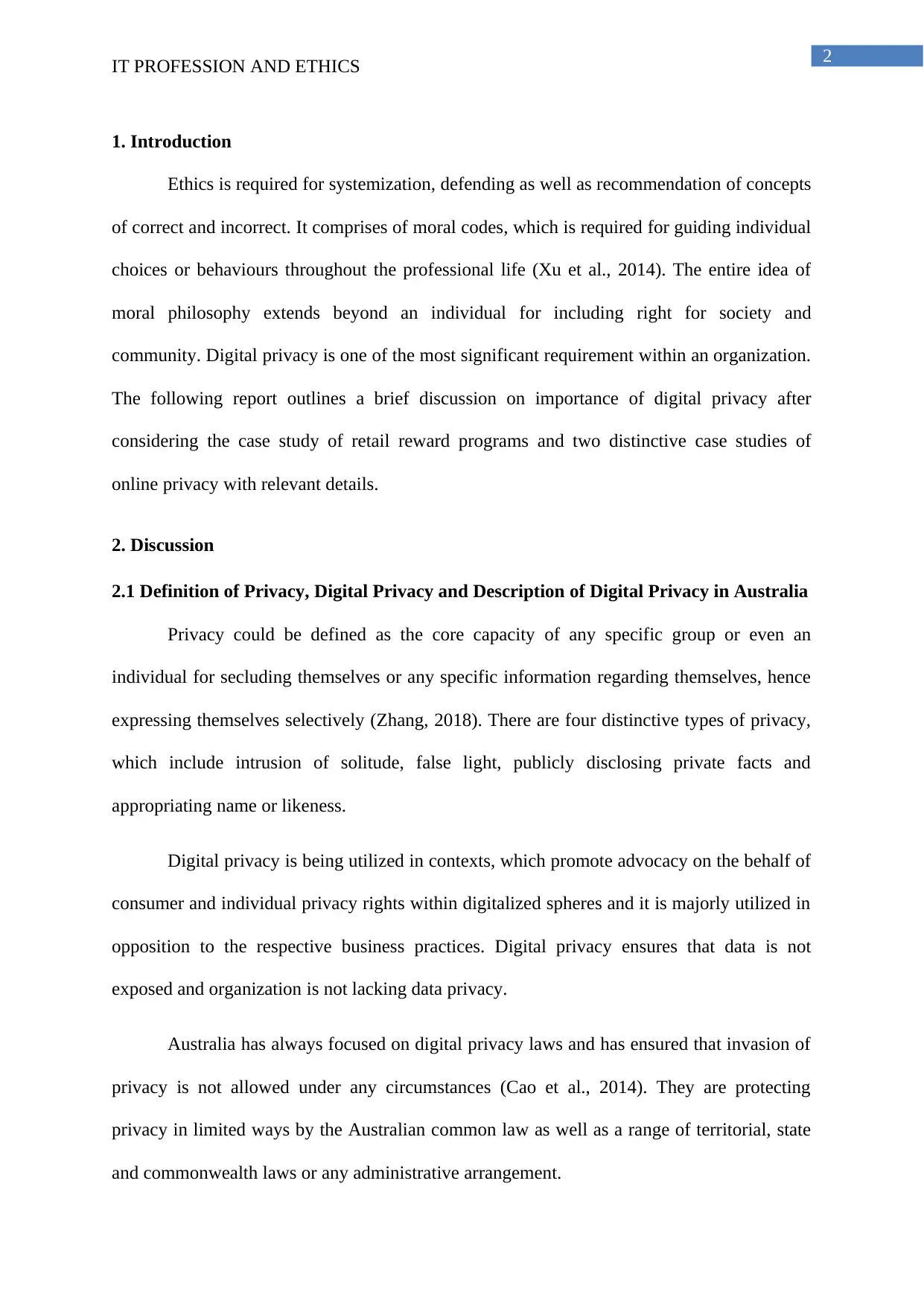
2
IT PROFESSION AND ETHICS
1. Introduction
Ethics is required for systemization, defending as well as recommendation of concepts
of correct and incorrect. It comprises of moral codes, which is required for guiding individual
choices or behaviours throughout the professional life (Xu et al., 2014). The entire idea of
moral philosophy extends beyond an individual for including right for society and
community. Digital privacy is one of the most significant requirement within an organization.
The following report outlines a brief discussion on importance of digital privacy after
considering the case study of retail reward programs and two distinctive case studies of
online privacy with relevant details.
2. Discussion
2.1 Definition of Privacy, Digital Privacy and Description of Digital Privacy in Australia
Privacy could be defined as the core capacity of any specific group or even an
individual for secluding themselves or any specific information regarding themselves, hence
expressing themselves selectively (Zhang, 2018). There are four distinctive types of privacy,
which include intrusion of solitude, false light, publicly disclosing private facts and
appropriating name or likeness.
Digital privacy is being utilized in contexts, which promote advocacy on the behalf of
consumer and individual privacy rights within digitalized spheres and it is majorly utilized in
opposition to the respective business practices. Digital privacy ensures that data is not
exposed and organization is not lacking data privacy.
Australia has always focused on digital privacy laws and has ensured that invasion of
privacy is not allowed under any circumstances (Cao et al., 2014). They are protecting
privacy in limited ways by the Australian common law as well as a range of territorial, state
and commonwealth laws or any administrative arrangement.
IT PROFESSION AND ETHICS
1. Introduction
Ethics is required for systemization, defending as well as recommendation of concepts
of correct and incorrect. It comprises of moral codes, which is required for guiding individual
choices or behaviours throughout the professional life (Xu et al., 2014). The entire idea of
moral philosophy extends beyond an individual for including right for society and
community. Digital privacy is one of the most significant requirement within an organization.
The following report outlines a brief discussion on importance of digital privacy after
considering the case study of retail reward programs and two distinctive case studies of
online privacy with relevant details.
2. Discussion
2.1 Definition of Privacy, Digital Privacy and Description of Digital Privacy in Australia
Privacy could be defined as the core capacity of any specific group or even an
individual for secluding themselves or any specific information regarding themselves, hence
expressing themselves selectively (Zhang, 2018). There are four distinctive types of privacy,
which include intrusion of solitude, false light, publicly disclosing private facts and
appropriating name or likeness.
Digital privacy is being utilized in contexts, which promote advocacy on the behalf of
consumer and individual privacy rights within digitalized spheres and it is majorly utilized in
opposition to the respective business practices. Digital privacy ensures that data is not
exposed and organization is not lacking data privacy.
Australia has always focused on digital privacy laws and has ensured that invasion of
privacy is not allowed under any circumstances (Cao et al., 2014). They are protecting
privacy in limited ways by the Australian common law as well as a range of territorial, state
and commonwealth laws or any administrative arrangement.
⊘ This is a preview!⊘
Do you want full access?
Subscribe today to unlock all pages.

Trusted by 1+ million students worldwide
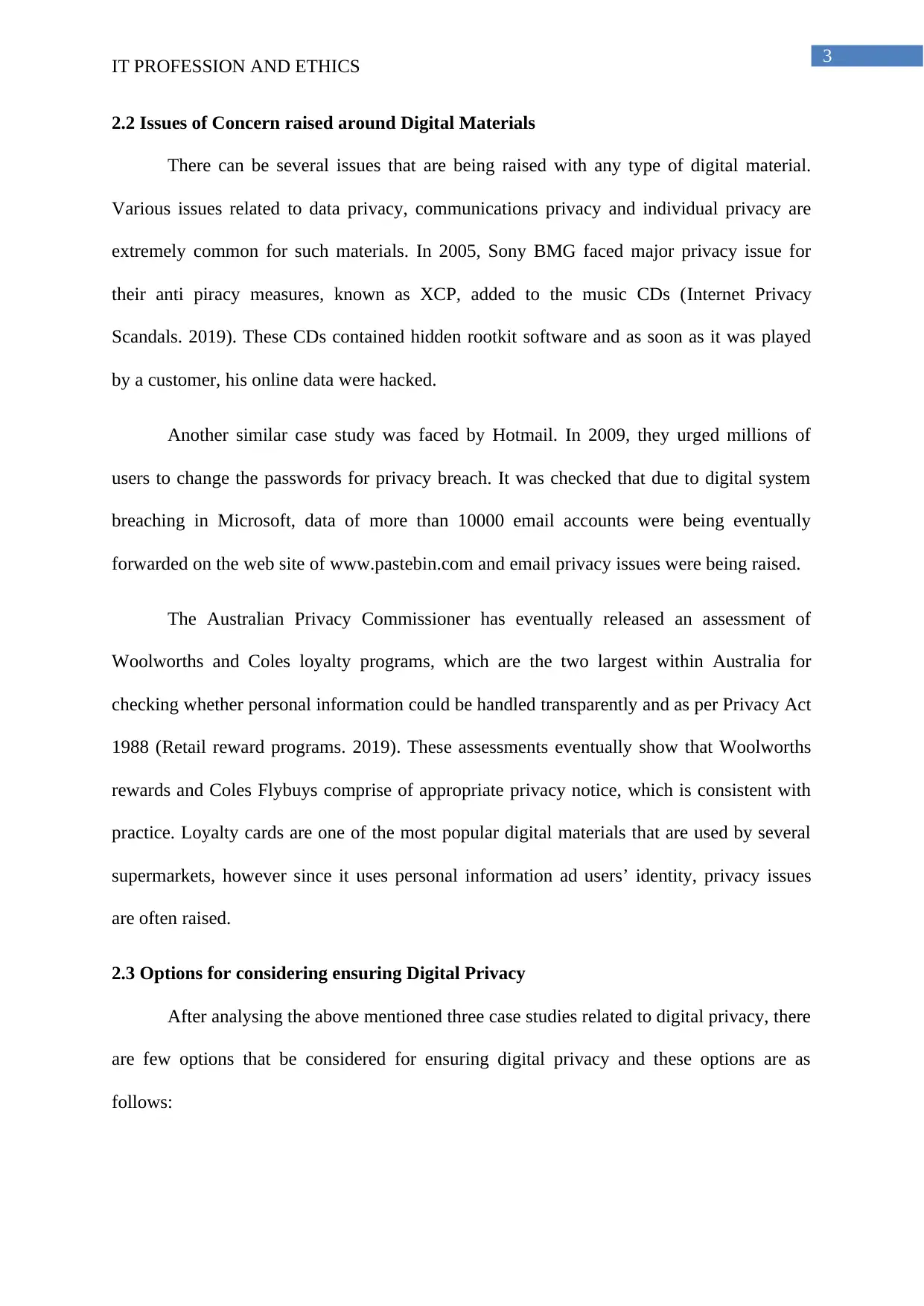
3
IT PROFESSION AND ETHICS
2.2 Issues of Concern raised around Digital Materials
There can be several issues that are being raised with any type of digital material.
Various issues related to data privacy, communications privacy and individual privacy are
extremely common for such materials. In 2005, Sony BMG faced major privacy issue for
their anti piracy measures, known as XCP, added to the music CDs (Internet Privacy
Scandals. 2019). These CDs contained hidden rootkit software and as soon as it was played
by a customer, his online data were hacked.
Another similar case study was faced by Hotmail. In 2009, they urged millions of
users to change the passwords for privacy breach. It was checked that due to digital system
breaching in Microsoft, data of more than 10000 email accounts were being eventually
forwarded on the web site of www.pastebin.com and email privacy issues were being raised.
The Australian Privacy Commissioner has eventually released an assessment of
Woolworths and Coles loyalty programs, which are the two largest within Australia for
checking whether personal information could be handled transparently and as per Privacy Act
1988 (Retail reward programs. 2019). These assessments eventually show that Woolworths
rewards and Coles Flybuys comprise of appropriate privacy notice, which is consistent with
practice. Loyalty cards are one of the most popular digital materials that are used by several
supermarkets, however since it uses personal information ad users’ identity, privacy issues
are often raised.
2.3 Options for considering ensuring Digital Privacy
After analysing the above mentioned three case studies related to digital privacy, there
are few options that be considered for ensuring digital privacy and these options are as
follows:
IT PROFESSION AND ETHICS
2.2 Issues of Concern raised around Digital Materials
There can be several issues that are being raised with any type of digital material.
Various issues related to data privacy, communications privacy and individual privacy are
extremely common for such materials. In 2005, Sony BMG faced major privacy issue for
their anti piracy measures, known as XCP, added to the music CDs (Internet Privacy
Scandals. 2019). These CDs contained hidden rootkit software and as soon as it was played
by a customer, his online data were hacked.
Another similar case study was faced by Hotmail. In 2009, they urged millions of
users to change the passwords for privacy breach. It was checked that due to digital system
breaching in Microsoft, data of more than 10000 email accounts were being eventually
forwarded on the web site of www.pastebin.com and email privacy issues were being raised.
The Australian Privacy Commissioner has eventually released an assessment of
Woolworths and Coles loyalty programs, which are the two largest within Australia for
checking whether personal information could be handled transparently and as per Privacy Act
1988 (Retail reward programs. 2019). These assessments eventually show that Woolworths
rewards and Coles Flybuys comprise of appropriate privacy notice, which is consistent with
practice. Loyalty cards are one of the most popular digital materials that are used by several
supermarkets, however since it uses personal information ad users’ identity, privacy issues
are often raised.
2.3 Options for considering ensuring Digital Privacy
After analysing the above mentioned three case studies related to digital privacy, there
are few options that be considered for ensuring digital privacy and these options are as
follows:
Paraphrase This Document
Need a fresh take? Get an instant paraphrase of this document with our AI Paraphraser
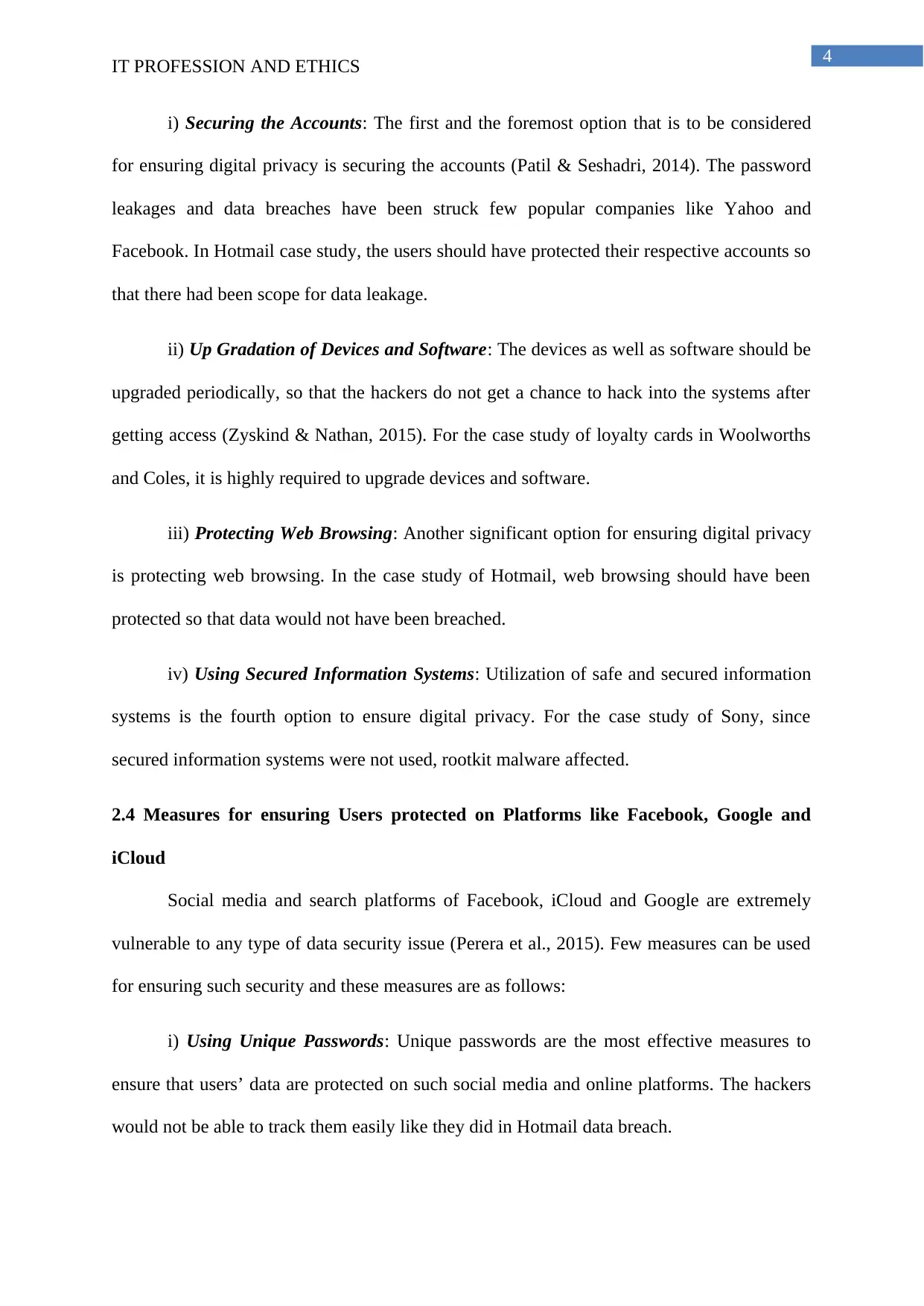
4
IT PROFESSION AND ETHICS
i) Securing the Accounts: The first and the foremost option that is to be considered
for ensuring digital privacy is securing the accounts (Patil & Seshadri, 2014). The password
leakages and data breaches have been struck few popular companies like Yahoo and
Facebook. In Hotmail case study, the users should have protected their respective accounts so
that there had been scope for data leakage.
ii) Up Gradation of Devices and Software: The devices as well as software should be
upgraded periodically, so that the hackers do not get a chance to hack into the systems after
getting access (Zyskind & Nathan, 2015). For the case study of loyalty cards in Woolworths
and Coles, it is highly required to upgrade devices and software.
iii) Protecting Web Browsing: Another significant option for ensuring digital privacy
is protecting web browsing. In the case study of Hotmail, web browsing should have been
protected so that data would not have been breached.
iv) Using Secured Information Systems: Utilization of safe and secured information
systems is the fourth option to ensure digital privacy. For the case study of Sony, since
secured information systems were not used, rootkit malware affected.
2.4 Measures for ensuring Users protected on Platforms like Facebook, Google and
iCloud
Social media and search platforms of Facebook, iCloud and Google are extremely
vulnerable to any type of data security issue (Perera et al., 2015). Few measures can be used
for ensuring such security and these measures are as follows:
i) Using Unique Passwords: Unique passwords are the most effective measures to
ensure that users’ data are protected on such social media and online platforms. The hackers
would not be able to track them easily like they did in Hotmail data breach.
IT PROFESSION AND ETHICS
i) Securing the Accounts: The first and the foremost option that is to be considered
for ensuring digital privacy is securing the accounts (Patil & Seshadri, 2014). The password
leakages and data breaches have been struck few popular companies like Yahoo and
Facebook. In Hotmail case study, the users should have protected their respective accounts so
that there had been scope for data leakage.
ii) Up Gradation of Devices and Software: The devices as well as software should be
upgraded periodically, so that the hackers do not get a chance to hack into the systems after
getting access (Zyskind & Nathan, 2015). For the case study of loyalty cards in Woolworths
and Coles, it is highly required to upgrade devices and software.
iii) Protecting Web Browsing: Another significant option for ensuring digital privacy
is protecting web browsing. In the case study of Hotmail, web browsing should have been
protected so that data would not have been breached.
iv) Using Secured Information Systems: Utilization of safe and secured information
systems is the fourth option to ensure digital privacy. For the case study of Sony, since
secured information systems were not used, rootkit malware affected.
2.4 Measures for ensuring Users protected on Platforms like Facebook, Google and
iCloud
Social media and search platforms of Facebook, iCloud and Google are extremely
vulnerable to any type of data security issue (Perera et al., 2015). Few measures can be used
for ensuring such security and these measures are as follows:
i) Using Unique Passwords: Unique passwords are the most effective measures to
ensure that users’ data are protected on such social media and online platforms. The hackers
would not be able to track them easily like they did in Hotmail data breach.
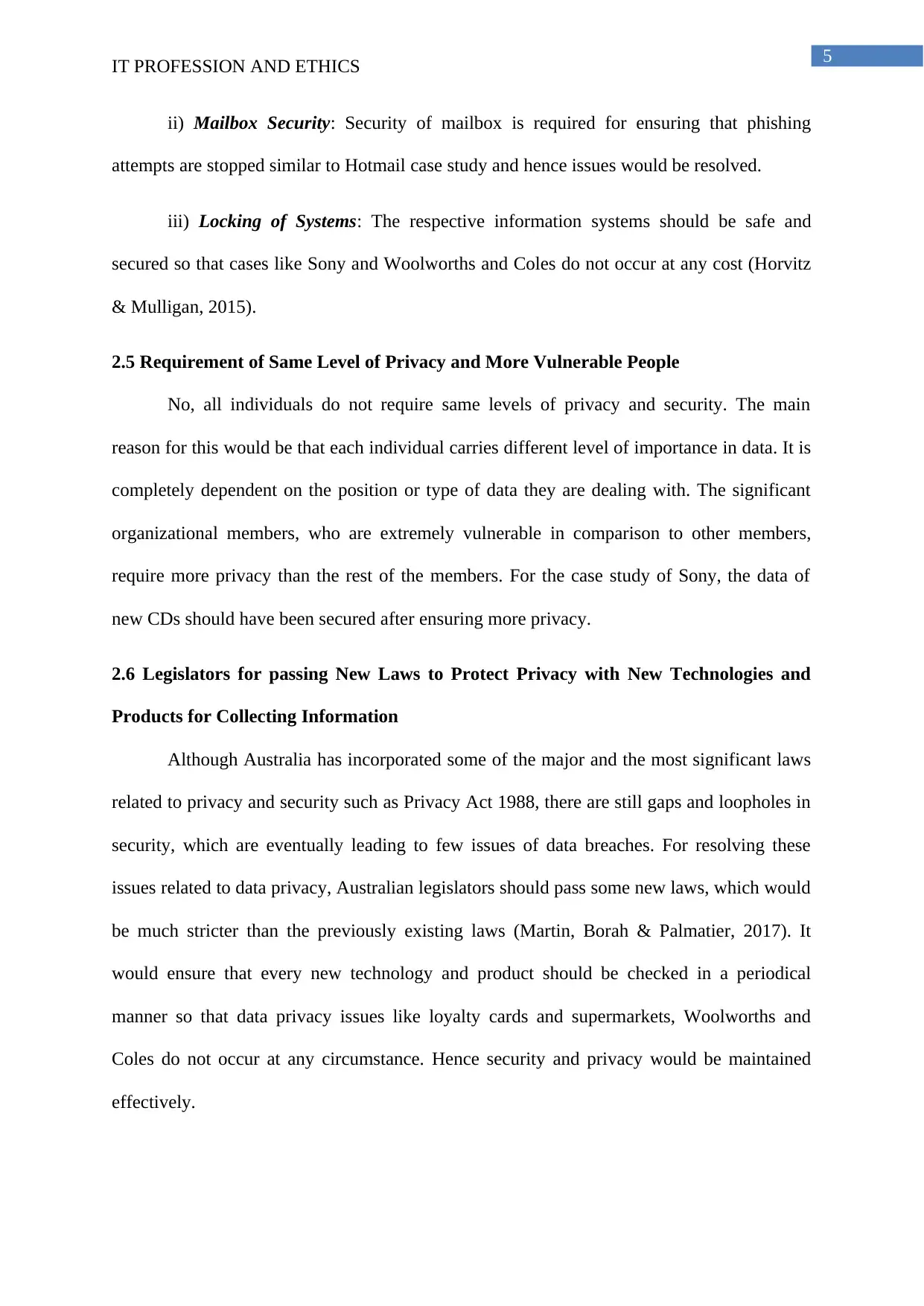
5
IT PROFESSION AND ETHICS
ii) Mailbox Security: Security of mailbox is required for ensuring that phishing
attempts are stopped similar to Hotmail case study and hence issues would be resolved.
iii) Locking of Systems: The respective information systems should be safe and
secured so that cases like Sony and Woolworths and Coles do not occur at any cost (Horvitz
& Mulligan, 2015).
2.5 Requirement of Same Level of Privacy and More Vulnerable People
No, all individuals do not require same levels of privacy and security. The main
reason for this would be that each individual carries different level of importance in data. It is
completely dependent on the position or type of data they are dealing with. The significant
organizational members, who are extremely vulnerable in comparison to other members,
require more privacy than the rest of the members. For the case study of Sony, the data of
new CDs should have been secured after ensuring more privacy.
2.6 Legislators for passing New Laws to Protect Privacy with New Technologies and
Products for Collecting Information
Although Australia has incorporated some of the major and the most significant laws
related to privacy and security such as Privacy Act 1988, there are still gaps and loopholes in
security, which are eventually leading to few issues of data breaches. For resolving these
issues related to data privacy, Australian legislators should pass some new laws, which would
be much stricter than the previously existing laws (Martin, Borah & Palmatier, 2017). It
would ensure that every new technology and product should be checked in a periodical
manner so that data privacy issues like loyalty cards and supermarkets, Woolworths and
Coles do not occur at any circumstance. Hence security and privacy would be maintained
effectively.
IT PROFESSION AND ETHICS
ii) Mailbox Security: Security of mailbox is required for ensuring that phishing
attempts are stopped similar to Hotmail case study and hence issues would be resolved.
iii) Locking of Systems: The respective information systems should be safe and
secured so that cases like Sony and Woolworths and Coles do not occur at any cost (Horvitz
& Mulligan, 2015).
2.5 Requirement of Same Level of Privacy and More Vulnerable People
No, all individuals do not require same levels of privacy and security. The main
reason for this would be that each individual carries different level of importance in data. It is
completely dependent on the position or type of data they are dealing with. The significant
organizational members, who are extremely vulnerable in comparison to other members,
require more privacy than the rest of the members. For the case study of Sony, the data of
new CDs should have been secured after ensuring more privacy.
2.6 Legislators for passing New Laws to Protect Privacy with New Technologies and
Products for Collecting Information
Although Australia has incorporated some of the major and the most significant laws
related to privacy and security such as Privacy Act 1988, there are still gaps and loopholes in
security, which are eventually leading to few issues of data breaches. For resolving these
issues related to data privacy, Australian legislators should pass some new laws, which would
be much stricter than the previously existing laws (Martin, Borah & Palmatier, 2017). It
would ensure that every new technology and product should be checked in a periodical
manner so that data privacy issues like loyalty cards and supermarkets, Woolworths and
Coles do not occur at any circumstance. Hence security and privacy would be maintained
effectively.
⊘ This is a preview!⊘
Do you want full access?
Subscribe today to unlock all pages.

Trusted by 1+ million students worldwide
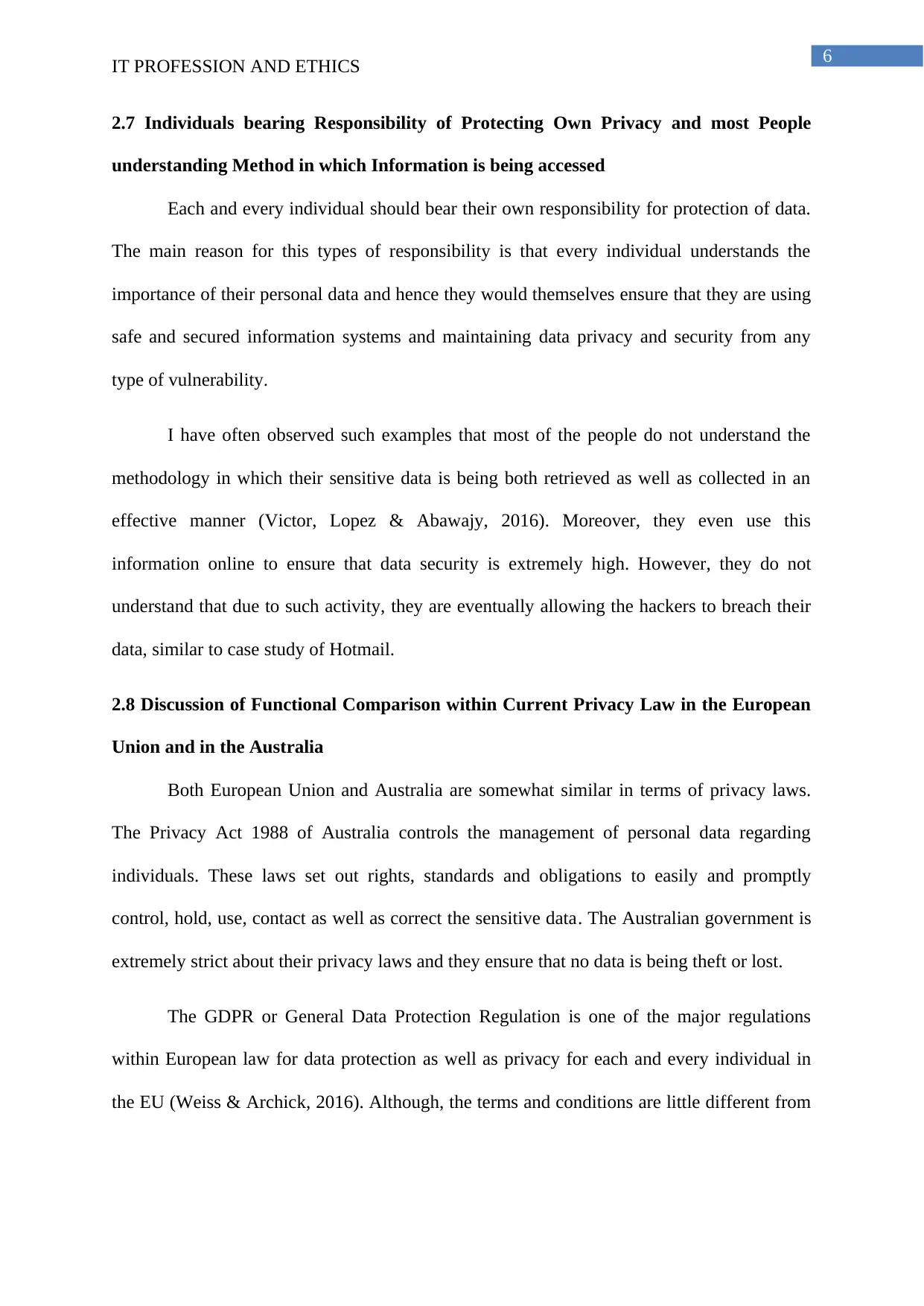
6
IT PROFESSION AND ETHICS
2.7 Individuals bearing Responsibility of Protecting Own Privacy and most People
understanding Method in which Information is being accessed
Each and every individual should bear their own responsibility for protection of data.
The main reason for this types of responsibility is that every individual understands the
importance of their personal data and hence they would themselves ensure that they are using
safe and secured information systems and maintaining data privacy and security from any
type of vulnerability.
I have often observed such examples that most of the people do not understand the
methodology in which their sensitive data is being both retrieved as well as collected in an
effective manner (Victor, Lopez & Abawajy, 2016). Moreover, they even use this
information online to ensure that data security is extremely high. However, they do not
understand that due to such activity, they are eventually allowing the hackers to breach their
data, similar to case study of Hotmail.
2.8 Discussion of Functional Comparison within Current Privacy Law in the European
Union and in the Australia
Both European Union and Australia are somewhat similar in terms of privacy laws.
The Privacy Act 1988 of Australia controls the management of personal data regarding
individuals. These laws set out rights, standards and obligations to easily and promptly
control, hold, use, contact as well as correct the sensitive data. The Australian government is
extremely strict about their privacy laws and they ensure that no data is being theft or lost.
The GDPR or General Data Protection Regulation is one of the major regulations
within European law for data protection as well as privacy for each and every individual in
the EU (Weiss & Archick, 2016). Although, the terms and conditions are little different from
IT PROFESSION AND ETHICS
2.7 Individuals bearing Responsibility of Protecting Own Privacy and most People
understanding Method in which Information is being accessed
Each and every individual should bear their own responsibility for protection of data.
The main reason for this types of responsibility is that every individual understands the
importance of their personal data and hence they would themselves ensure that they are using
safe and secured information systems and maintaining data privacy and security from any
type of vulnerability.
I have often observed such examples that most of the people do not understand the
methodology in which their sensitive data is being both retrieved as well as collected in an
effective manner (Victor, Lopez & Abawajy, 2016). Moreover, they even use this
information online to ensure that data security is extremely high. However, they do not
understand that due to such activity, they are eventually allowing the hackers to breach their
data, similar to case study of Hotmail.
2.8 Discussion of Functional Comparison within Current Privacy Law in the European
Union and in the Australia
Both European Union and Australia are somewhat similar in terms of privacy laws.
The Privacy Act 1988 of Australia controls the management of personal data regarding
individuals. These laws set out rights, standards and obligations to easily and promptly
control, hold, use, contact as well as correct the sensitive data. The Australian government is
extremely strict about their privacy laws and they ensure that no data is being theft or lost.
The GDPR or General Data Protection Regulation is one of the major regulations
within European law for data protection as well as privacy for each and every individual in
the EU (Weiss & Archick, 2016). Although, the terms and conditions are little different from
Paraphrase This Document
Need a fresh take? Get an instant paraphrase of this document with our AI Paraphraser
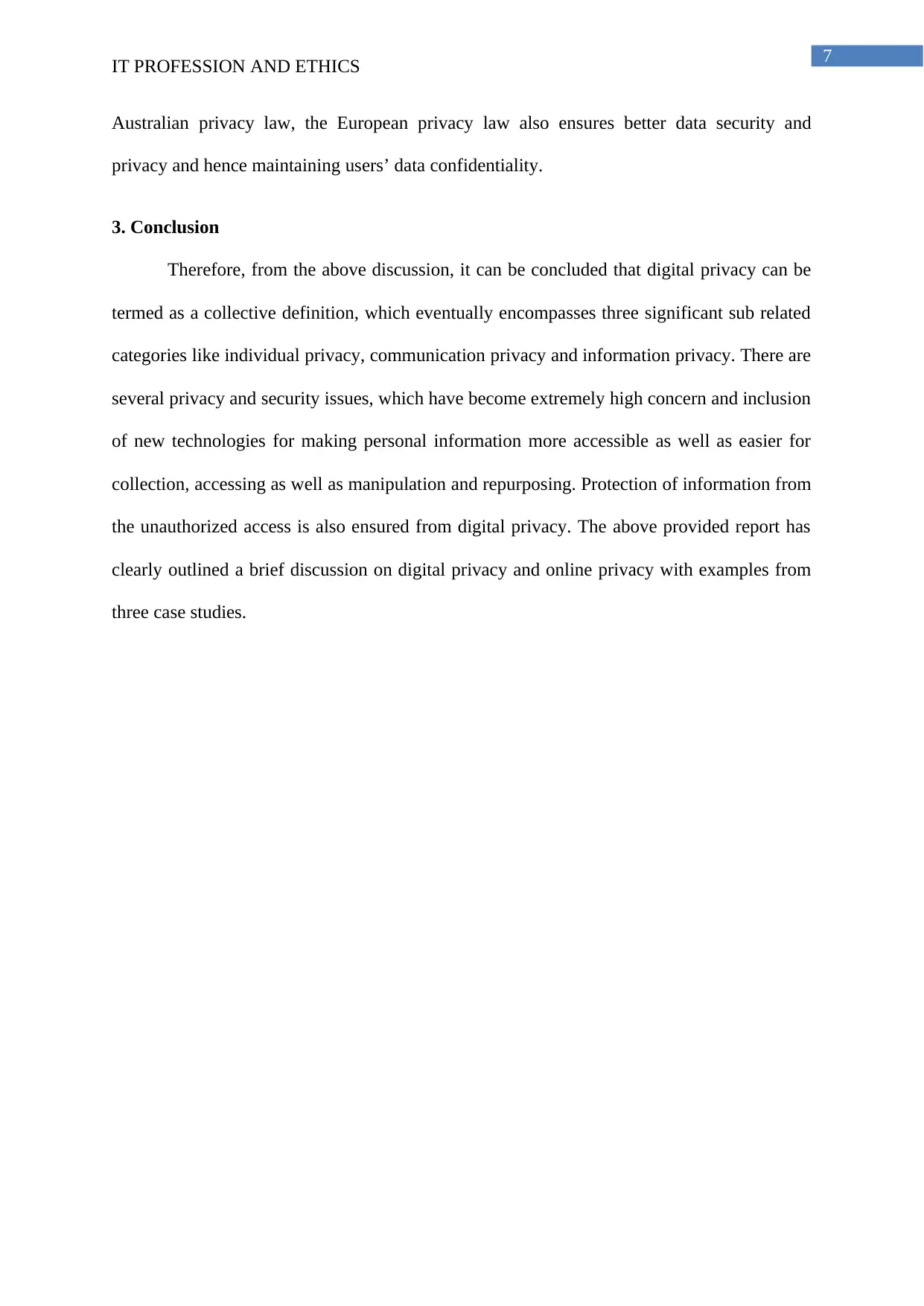
7
IT PROFESSION AND ETHICS
Australian privacy law, the European privacy law also ensures better data security and
privacy and hence maintaining users’ data confidentiality.
3. Conclusion
Therefore, from the above discussion, it can be concluded that digital privacy can be
termed as a collective definition, which eventually encompasses three significant sub related
categories like individual privacy, communication privacy and information privacy. There are
several privacy and security issues, which have become extremely high concern and inclusion
of new technologies for making personal information more accessible as well as easier for
collection, accessing as well as manipulation and repurposing. Protection of information from
the unauthorized access is also ensured from digital privacy. The above provided report has
clearly outlined a brief discussion on digital privacy and online privacy with examples from
three case studies.
IT PROFESSION AND ETHICS
Australian privacy law, the European privacy law also ensures better data security and
privacy and hence maintaining users’ data confidentiality.
3. Conclusion
Therefore, from the above discussion, it can be concluded that digital privacy can be
termed as a collective definition, which eventually encompasses three significant sub related
categories like individual privacy, communication privacy and information privacy. There are
several privacy and security issues, which have become extremely high concern and inclusion
of new technologies for making personal information more accessible as well as easier for
collection, accessing as well as manipulation and repurposing. Protection of information from
the unauthorized access is also ensured from digital privacy. The above provided report has
clearly outlined a brief discussion on digital privacy and online privacy with examples from
three case studies.
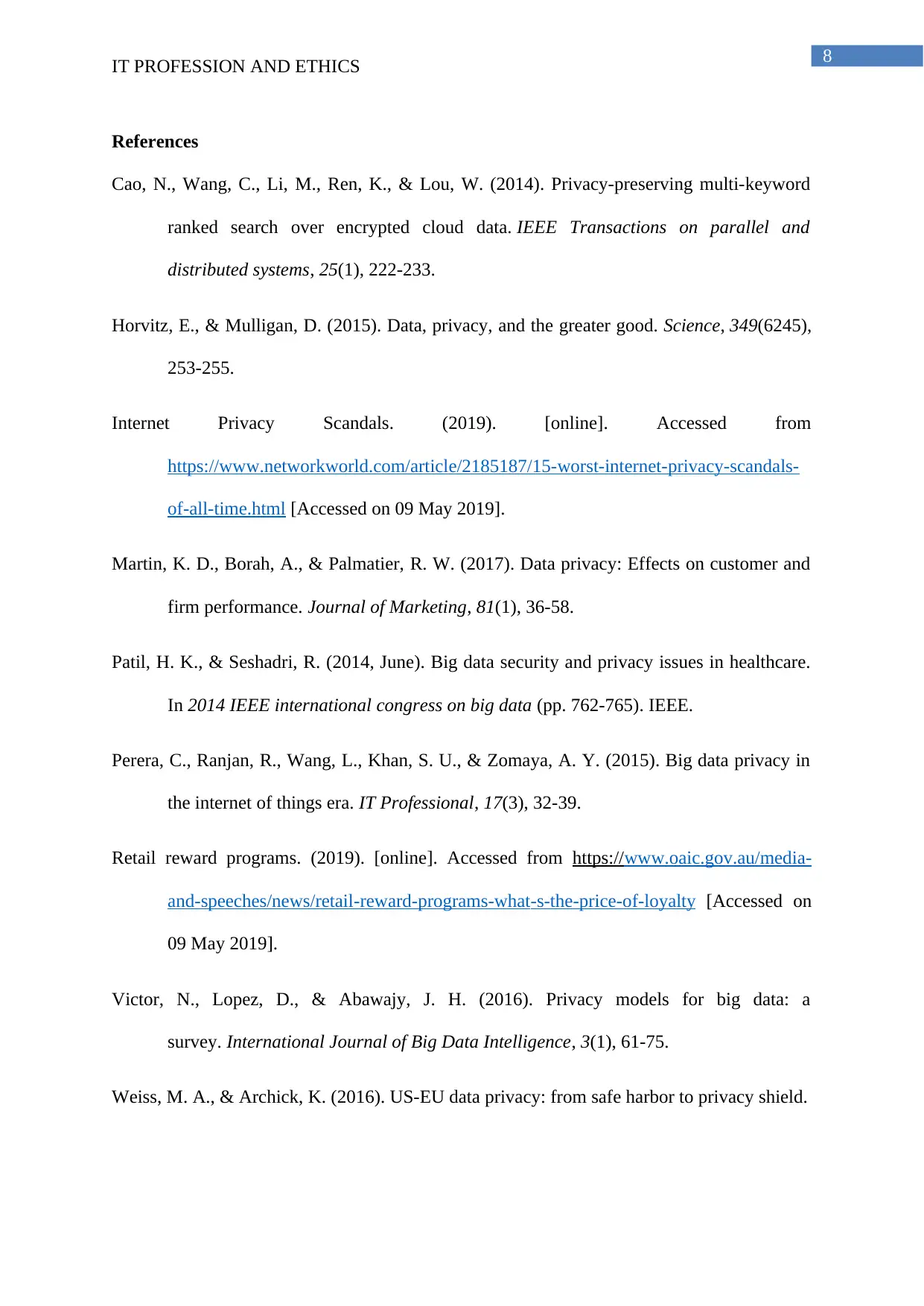
8
IT PROFESSION AND ETHICS
References
Cao, N., Wang, C., Li, M., Ren, K., & Lou, W. (2014). Privacy-preserving multi-keyword
ranked search over encrypted cloud data. IEEE Transactions on parallel and
distributed systems, 25(1), 222-233.
Horvitz, E., & Mulligan, D. (2015). Data, privacy, and the greater good. Science, 349(6245),
253-255.
Internet Privacy Scandals. (2019). [online]. Accessed from
https://www.networkworld.com/article/2185187/15-worst-internet-privacy-scandals-
of-all-time.html [Accessed on 09 May 2019].
Martin, K. D., Borah, A., & Palmatier, R. W. (2017). Data privacy: Effects on customer and
firm performance. Journal of Marketing, 81(1), 36-58.
Patil, H. K., & Seshadri, R. (2014, June). Big data security and privacy issues in healthcare.
In 2014 IEEE international congress on big data (pp. 762-765). IEEE.
Perera, C., Ranjan, R., Wang, L., Khan, S. U., & Zomaya, A. Y. (2015). Big data privacy in
the internet of things era. IT Professional, 17(3), 32-39.
Retail reward programs. (2019). [online]. Accessed from https://www.oaic.gov.au/media-
and-speeches/news/retail-reward-programs-what-s-the-price-of-loyalty [Accessed on
09 May 2019].
Victor, N., Lopez, D., & Abawajy, J. H. (2016). Privacy models for big data: a
survey. International Journal of Big Data Intelligence, 3(1), 61-75.
Weiss, M. A., & Archick, K. (2016). US-EU data privacy: from safe harbor to privacy shield.
IT PROFESSION AND ETHICS
References
Cao, N., Wang, C., Li, M., Ren, K., & Lou, W. (2014). Privacy-preserving multi-keyword
ranked search over encrypted cloud data. IEEE Transactions on parallel and
distributed systems, 25(1), 222-233.
Horvitz, E., & Mulligan, D. (2015). Data, privacy, and the greater good. Science, 349(6245),
253-255.
Internet Privacy Scandals. (2019). [online]. Accessed from
https://www.networkworld.com/article/2185187/15-worst-internet-privacy-scandals-
of-all-time.html [Accessed on 09 May 2019].
Martin, K. D., Borah, A., & Palmatier, R. W. (2017). Data privacy: Effects on customer and
firm performance. Journal of Marketing, 81(1), 36-58.
Patil, H. K., & Seshadri, R. (2014, June). Big data security and privacy issues in healthcare.
In 2014 IEEE international congress on big data (pp. 762-765). IEEE.
Perera, C., Ranjan, R., Wang, L., Khan, S. U., & Zomaya, A. Y. (2015). Big data privacy in
the internet of things era. IT Professional, 17(3), 32-39.
Retail reward programs. (2019). [online]. Accessed from https://www.oaic.gov.au/media-
and-speeches/news/retail-reward-programs-what-s-the-price-of-loyalty [Accessed on
09 May 2019].
Victor, N., Lopez, D., & Abawajy, J. H. (2016). Privacy models for big data: a
survey. International Journal of Big Data Intelligence, 3(1), 61-75.
Weiss, M. A., & Archick, K. (2016). US-EU data privacy: from safe harbor to privacy shield.
⊘ This is a preview!⊘
Do you want full access?
Subscribe today to unlock all pages.

Trusted by 1+ million students worldwide
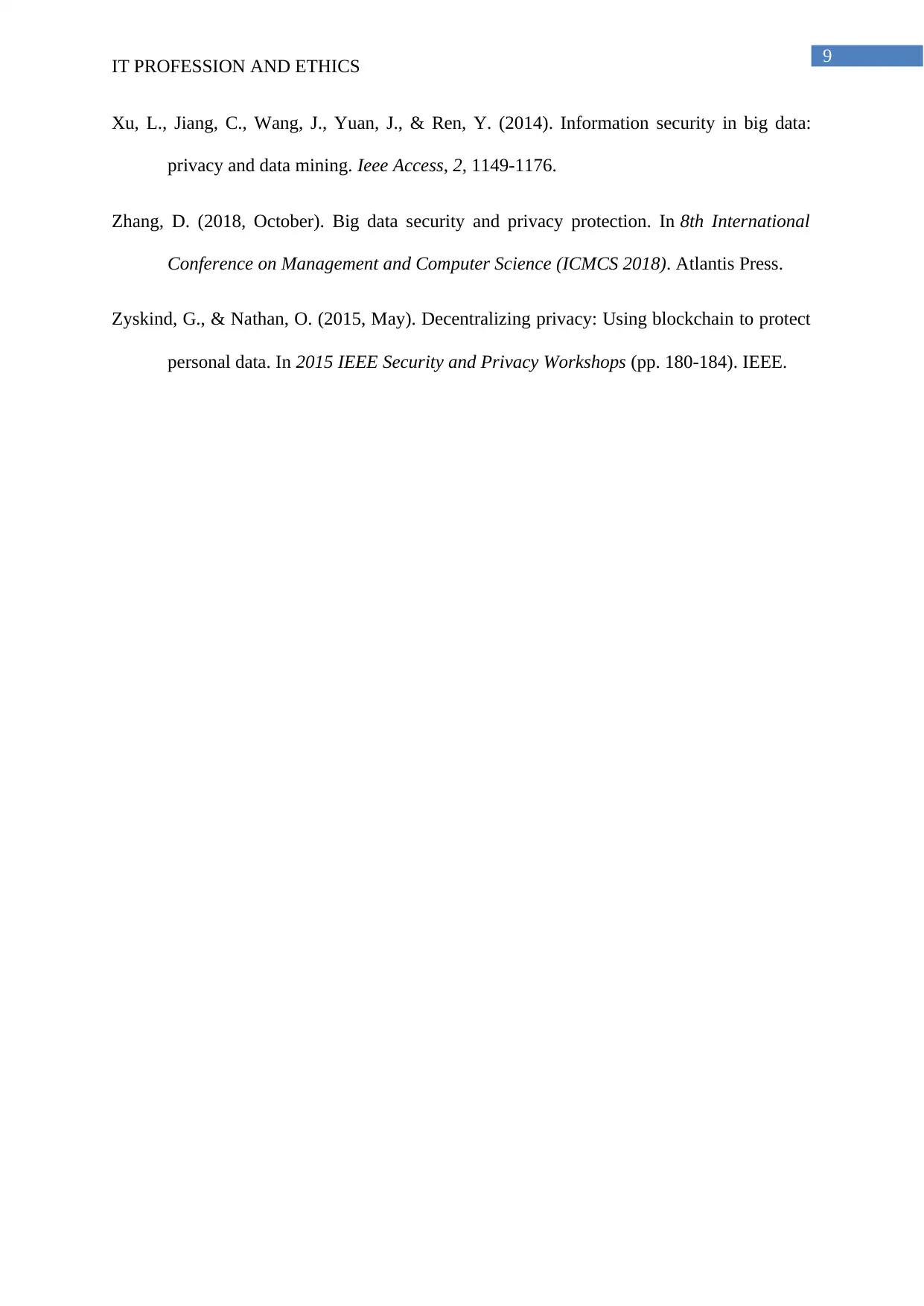
9
IT PROFESSION AND ETHICS
Xu, L., Jiang, C., Wang, J., Yuan, J., & Ren, Y. (2014). Information security in big data:
privacy and data mining. Ieee Access, 2, 1149-1176.
Zhang, D. (2018, October). Big data security and privacy protection. In 8th International
Conference on Management and Computer Science (ICMCS 2018). Atlantis Press.
Zyskind, G., & Nathan, O. (2015, May). Decentralizing privacy: Using blockchain to protect
personal data. In 2015 IEEE Security and Privacy Workshops (pp. 180-184). IEEE.
IT PROFESSION AND ETHICS
Xu, L., Jiang, C., Wang, J., Yuan, J., & Ren, Y. (2014). Information security in big data:
privacy and data mining. Ieee Access, 2, 1149-1176.
Zhang, D. (2018, October). Big data security and privacy protection. In 8th International
Conference on Management and Computer Science (ICMCS 2018). Atlantis Press.
Zyskind, G., & Nathan, O. (2015, May). Decentralizing privacy: Using blockchain to protect
personal data. In 2015 IEEE Security and Privacy Workshops (pp. 180-184). IEEE.
1 out of 10
Related Documents
Your All-in-One AI-Powered Toolkit for Academic Success.
+13062052269
info@desklib.com
Available 24*7 on WhatsApp / Email
![[object Object]](/_next/static/media/star-bottom.7253800d.svg)
Unlock your academic potential
Copyright © 2020–2026 A2Z Services. All Rights Reserved. Developed and managed by ZUCOL.





